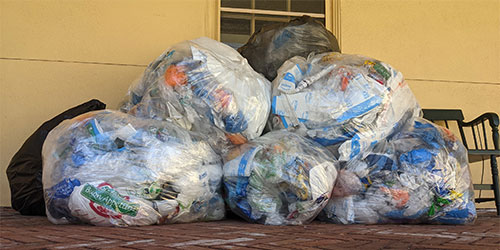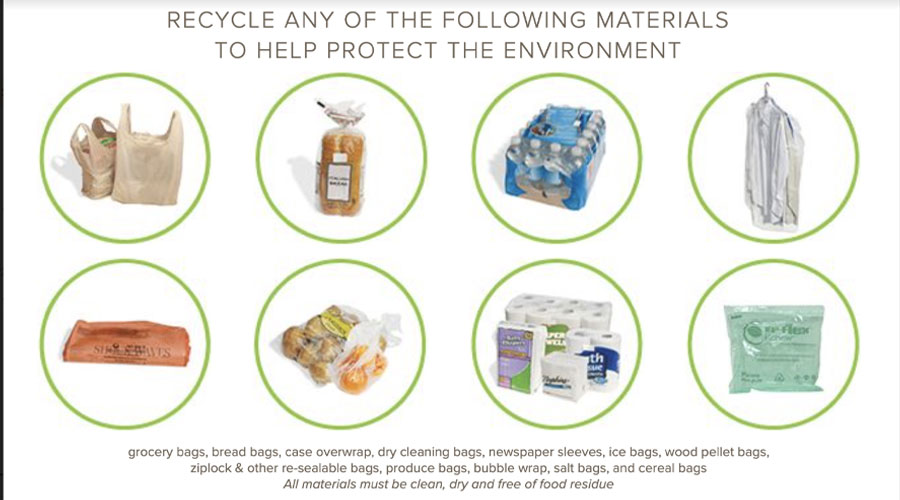
Recycling paper, metal cans, and plastic bottles has almost become second nature in society, but the world continues to face the challenge of what to do about other materials that are dumped in landfills — or worse, end up being scattered throughout the environment.
For the past year, Westover has been tackling a deceptively lightweight but still significant part of the problem through a program run by Trex Company, Inc. The School’s efforts are being coordinated by Heather Nuzzo, a science teacher who serves as the Director of Environmental Sustainability in Westover’s Rasin Center for Global Justice.
Company, Inc. The School’s efforts are being coordinated by Heather Nuzzo, a science teacher who serves as the Director of Environmental Sustainability in Westover’s Rasin Center for Global Justice.
“The company’s goal is to take plastic materials that are actually recyclable — but which traditionally haven’t been recycled very much — and turn them into useful products,” Heather said. The company has developed a process that takes plastic film — the stretchy material used in many kinds of plastic bags and are also often found in wrappers and other products, such as bread bags, zip-top bags, cereal bags, Saran Wrap, bubble wrap, and plastic mailers.
“Most recycling programs can't accept the thin plastic, like plastic bags, because they clog the machines used to separate materials,” Heather explained, “so these plastics usually end up in landfills, despite the fact that the material they are made from is capable of being recycled. If it is labeled as recyclable or ‘store recycle,’ it is good.” All of these plastic materials when recycled need to be clean and dry.
“Trex uses the types of plastic that most plastic films are made from and re-forms them into useful building materials like decking and outdoor furniture,” Heather explained. “To help build awareness and gather as much plastic as possible, the company runs the Trex Recycling Challenge in schools and universities.” For turning in the plastic film to Trex, participants in the challenge can win products produced by the company, depending on the amount of film submitted.
The challenge, which has been in operation for almost a decade, Heather said, “is a way for Trex to raise awareness and drive up donations for the product that they need.”
Heather first arranged for Westover to take part in the Trex Challenge in the fall of 2019, but shortly after the program was introduced, the pandemic forced Westover into a virtual school setting, limiting the program’s efforts on campus. “We started right before the world shut down,” she said.
Despite the program’s interrupted start last year, Heather added, “we won a flower planter for the School’s community garden” for collecting 19 pounds of plastic film — much of it donated by faculty and staff — by the end of the virtual school year last spring.
With the return of boarding students to campus this January to join the School’s day students, Heather said, it seemed a good time to renew Westover’s participation in this year’s Trex Recycling Challenge.
Trex works with partner companies, including a number of supermarket chains, to serve as drop-off points for schools that are collecting the plastic film.
As of this spring, the Westover community this year had already succeeded in gathering 61 pounds of plastic film — more than three times the amount collected by the end of the 2020 school year. Heather noted that an increase in deliveries of supplies from Amazon and other shipping vendors during the pandemic has provided a larger source of plastic film for Westover’s Trex Challenge.
With the influx of boarders in January, Heather said, there’s also been an additional increase in the amount of plastic film materials found in designated bins around campus, which include locations in the Post Office, Student Commons, Red Hall, and in the hallway outside the Rasin Center.
Early this spring, Heather noted, “we gathered a gigantic pile of bags containing the plastic film. It was huge but practically weightless,” she said with a laugh. She and her husband filled up both of their cars with the bags before taking them to the Big Y in Naugatuck, one of the designated drop-off points in the area for the Trex Challenge.
Heather said the supermarket chain has embarked on its own sustainability program — “some of their stores have gone completely solar,” she added. Heather is delighted to have found a nearby location to drop off the School’s growing supply of the recyclable plastic.
 Schools participating in the Trex Challenge compete based on their number of students, with Westover in the category of schools with 500 or fewer students. While the first-place winner in each category is given a park bench, Heather said Westover’s small size compared to others in the category has limited the School’s chances for a bench. Last year’s winner in Westover’s category — a large regional school — was able to collect an astonishing 7,000 pounds of plastic film, Heather added.
Schools participating in the Trex Challenge compete based on their number of students, with Westover in the category of schools with 500 or fewer students. While the first-place winner in each category is given a park bench, Heather said Westover’s small size compared to others in the category has limited the School’s chances for a bench. Last year’s winner in Westover’s category — a large regional school — was able to collect an astonishing 7,000 pounds of plastic film, Heather added.
Nevertheless, Heather is pleased by the School’s success so far. “I’m hoping we will have a matching flower box to the one we got last year.” She hopes the two boxes will be added to a shed that will be installed at the School’s community garden.
No matter what the School receives as a prize, though, Heather said the plastic film collected and recycled into new uses “will no longer end up in a landfill — or worse, in the ocean, where it can be mistaken for jellyfish” and fatally eaten by turtles and other sea creatures.
Heather noted that students who haven’t returned to campus but are still attending classes virtually may be able to find ways to collect and recycle the plastic film while at home.
“Students at home in the U.S. can still participate in the challenge,” Heather said. She has posted a list for each state that includes participating locations, such as supermarkets and home improvement stores, that are working with Trex by accepting plastic films. When students have collected a supply of the material, they can bring it to one of the participating locations and fill out a Google Form Heather has shared so the student’s drop-off amount can be added to Westover’s challenge total.
Though international students living at home cannot help with the challenge, Heather has encouraged them “to look into your local recycling programs and restrictions on recycling plastic films. Each country is different in how they gather and accept recycling.”
By taking part in the Trex Recycling Challenge again this year, Heather hopes to continue building awareness within the community so that the School will be able to increase the amount of plastic film it recycles when Westover returns to a more normal school year.
The program will also help increase community participation in other forms of sustainability practices, she added, which will have an even wider effect on the well-being of the School and the world beyond.



